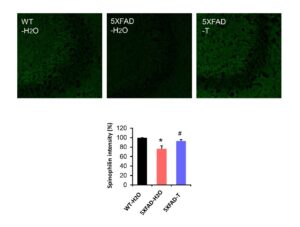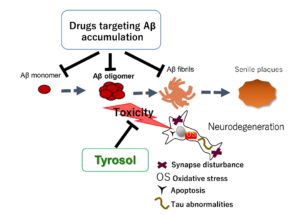Discovery of the new drug candidate
The CEO proposes ‘Aβ oligomer neurotoxicity-reducing therapy’ to prevent the progression from mild cognitive impairment (MCI) to Alzheimer’s dementia. It is known that amyloid-β (Aβ) forms soluble assemblies called Aβ oligomer before it fibrilizes and becomes insoluble, which exerts neurotoxicity. Thus, Aβ oligomer is a highly important therapeutic target. The CEO used a neuron culture system to explore compounds which can reduce Aβ oligomer neurotoxicity itself and discovered an effective natural compound. Then he successfully demonstrated that oral administration of the compound effectively reversed synaptic and oxidative disturbances and alleviated cognitive impairment in Alzheimer’s disease model mice (lower figure 1).
This compound, tyrosol is known to be an antioxidant which is abundant in such plants as olives and Rhodiola rosea.
As summarized in the previous section, it is very important to prevent the occurrence of dementia by appropriate interventions at the stage of MCI due to AD preceding Alzheimer’s dementia. This compound (tyrosol) has several characteristics suitable for this purpose, as follows.
① It has a unique mechanism of action; it acts on the core part in the pathological mechanism (lower figure 2). It is expected to produce synergistic effects by using in combination with other drugs.
② It can be safely taken for a long time without risk of side effects.
③ It can be taken orally. It is thought to be brain-penetrant and have long-lasting effects.
④ Its manufacturing process is relatively simple, and it has high economic efficiency.
We propose that it is a promising candidate of an effective and safe drug (or medical food), which can be helpful for the treatment and prevention of MCI due to AD.
Patentability:
The CEO applied for a patent to claim the patentability of the compound. Recently, we obtained a patent in Japan (JP 7333626) in August 2023.
We are now aiming at developing medical food or a drug utilizing this candidate compound. To do so, we are seeking an opportunity to collaborate with a company which can be interested in such a proposal. We are also focusing on related consultation activities. We welcome contacts or inquiries from companies which are interested in our proposal.
1.Suppression of synaptic disturbance in the brain of the AD model mice

The immunoreactive intensity of spinophilin, a synapse-associated protein, was significantly decreased in the hippocampus of water-treated 5XFAD mice, compared with wild-type mice. However, the decrease was significantly suppressed in 5XFAD mice treated with water containing the compound.
Beside this effect, the compound significantly reduced the oxidative stress response in the hippocampus of 5XFAD mice, and also modestly mitigated the cognitive impairment in the Barnes maze test.
2.Distinct mechanism of action

Tyrosol is expected to effectively prevent the pathological progression through the reduction of the neurotoxicity of Aβ oligomers. On the contrary, most drugs under development act through different mechanisms such as removal of Aβ oligomers.
Research paper describing the discovery of the compound can be found here
*The CEO carried out this study, when he worked at the National Institute of Neuroscience, National Center of Neurology and Psychiatry, in collaboration with researchers at other facilities including Tokiwa Phytochemical Co., Ltd. and Tsukuba University.